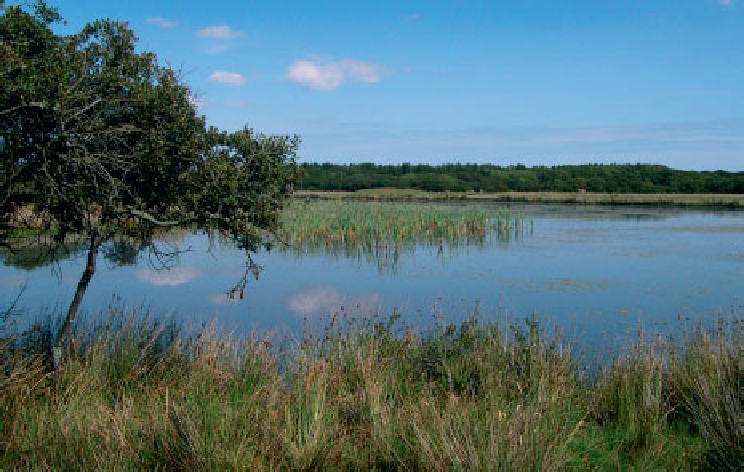Environmental Engineering Reference
In-Depth Information
FIG
133.
Broad Pool, the largest pool on the commons, from the southwest. (Jonathan Mullard)
Although the pool appears to be natural in origin, being a clay-plugged depression, it has been mod-
ified by the removal of sediment and vegetation from the late eighteenth century onwards. Licences to
dig mud were issued in both the eighteenth and nineteenth centuries, and this was probably mixed with
lime for use as a fertiliser. Without this type of intervention there is little doubt that it would have filled
up with vegetation long ago. It is possible that the pool has been enlarged by these activities. Its position,
immediately beside the main road across the common (the so-called Red Road owing to the underlying
redsandstone)makesitaconvenientsiteforwateringstock,anditispossiblethatmaterialwasdugoutto
make the road. More recently it is known that no material was extracted from the pool between 1936 and
1984.Duringtheprolongeddroughtinthesummerof1984BroadPooldriedupcompletely,thefirsttime
thishadhappenedsincethe1970s,whenevenintheexceptionallyhotyearof1976asmallamountofwa-
terremained.SincethepoolhadbeguntosiltuptheTrustdecidedtotakeariskandtakeheavymachinery
into the pool, hoping that the clay lining would not be broken. In all nearly 2,000 tonnes of plant material
and silt was extracted, and luckily the restoration work was successful. Approximately one-eighth of the
area was left untouched to allow recolonisation by plants and animals.
The pool is notable for the presence of fringed water-lily
Nymphoides peltata
(Fig. 134). This attract-
ive species is a native of eastern England and was a rare alien in Wales, although it now occurs in many
other pools in Gower and Swansea. It was introduced to the pool during the late 1940s or early 1950s by
persons unknown. The plant grew well, but in 1960 there was still a lot of open water and the fringed
water-lily occupied only a small area near the road. The location of this species on the roadside edge of
thepoolissignificantasthefirstGlamorganrecordin1984ofanotheralienspecies,NewZealandpigmy-
weed
Crassula helmsii
, was also from Broad Pool and it is likely that the pool's convenient situation,
adjacent to one of the main Gower roads, is the reason for the occurrence of alien plants at this site. The
pigmyweed is sold in garden centres as an oxygenating plant for aquaria and garden ponds.

